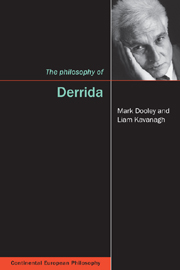Book contents
- Frontmatter
- Contents
- Preface
- Abbreviations
- 1 The catastrophe of memory: identity and mourning
- 2 Death and différance: philosophy and language
- 3 Repetition and post cards: psychoanalysis and phenomenology
- 4 The risks of negotiation: ethics and politics
- Afterword
- Notes
- Suggestions for further reading
- References
- Index
Preface
- Frontmatter
- Contents
- Preface
- Abbreviations
- 1 The catastrophe of memory: identity and mourning
- 2 Death and différance: philosophy and language
- 3 Repetition and post cards: psychoanalysis and phenomenology
- 4 The risks of negotiation: ethics and politics
- Afterword
- Notes
- Suggestions for further reading
- References
- Index
Summary
This book has two aims. First, it attempts to bring clarity to the philosophy of Jacques Derrida. Secondly, it does so by arguing that he is fundamentally concerned with the related questions of memory and identity. Our central assertion is that misunderstandings of Derrida arise because of his obscure prose style, and because few commentators have tried to draw out an underlying theme in his work. We contend that his diverse writings do contain such a theme, and that it gives them continuity and structure.
In short, this book argues that, like Plato and Hegel before him, Jacques Derrida believes that a human being's identity is built on memory. When we think about our historical origins we rely on memory to recollect whence we came. For Plato that means recalling the true nature of the self in the immaterial world of the Forms. For Hegel it means dialectically recovering the self through the various stages of consciousness. But in both cases the objective is to overcome alienation by achieving full self-awareness. Selfidentity, in other words, means reclaiming our origins through the use of memory.
For Derrida, however, recovering the self from the manifold layers of time and history is much more complex than Plato, Hegel or indeed most philosophers are prepared to concede. And despite the notorious difficulties encountered by those attempting to read him, his point is simple: we are from the beginning of existence situated at the end of a multilayered web of beliefs and practices.
- Type
- Chapter
- Information
- The Philosophy of Derrida , pp. vii - ixPublisher: Acumen PublishingPrint publication year: 2006

